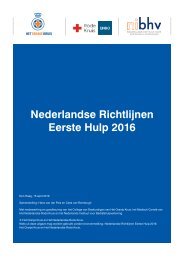Thesis-Anne-Vos-Masters-SBR-and-EU-Law-3
Thesis-Anne-Vos-Masters-SBR-and-EU-Law-3
Thesis-Anne-Vos-Masters-SBR-and-EU-Law-3
Create successful ePaper yourself
Turn your PDF publications into a flip-book with our unique Google optimized e-Paper software.
in environmental decision-making (democracy), which principle will be discussed in the next<br />
paragraph. Also, it facilitates control on the public authorities when making environmental policies<br />
<strong>and</strong> decisions (political <strong>and</strong> administrative accountability). Moreover (with regard to the second<br />
level) it creates procedural fairness <strong>and</strong> equality of arms between the public authorities <strong>and</strong> the<br />
(mostly) environmental NGO's. 266<br />
5.3.2 Dutch level<br />
The first general principles (mainly) developed by the Dutch highest administrative court were the<br />
general principles of proper administration (algemene beginselen van behoorlijk bestuur). These<br />
principles were used by the courts to interpret vague norms or legislation which resulted from the<br />
appointment of broad discretionary powers to national administrations. In the meantime, most of<br />
these principles have been codified in the Algemene wet bestuursrecht in 1994. However, not all of<br />
them have been codified, so the unwritten law is still of relevance. 267 These principles are very<br />
important for grounds of review, grounds for nullification <strong>and</strong> as a legal st<strong>and</strong>ard for government<br />
action. Recently, other general principles have started to develop. These are the general principles<br />
of good administration (algemene beginselen van goed bestuur). Addink distinguishes six general<br />
principles of good administration: proper administration, transparency, participation, efficiency,<br />
accountability <strong>and</strong> human rights. 268 These principles are in the Netherl<strong>and</strong>s not as far developed as<br />
in other MS or the <strong>EU</strong>. 269 According to Addink, it seems that the Dutch administrative courts are<br />
more focussed on the (better known) principles of proper administration, whereby the development<br />
of the principles of good administration are somewhat 'left behind'. Also, when paying attention to<br />
the principles, the court mostly considers them individually instead of as the general concept of<br />
'good administration'. 270<br />
The administration itself has to comply with the (written <strong>and</strong> unwritten) principles of proper <strong>and</strong><br />
good administration. From the point of view of clarity <strong>and</strong> uniformity, some administrations have<br />
decided to develop <strong>and</strong> publish policies for which they can be held accountable (according to Art.<br />
4:84 Awb). 271 There are also Codes developed by other institutions. Administrations are bound to<br />
apply these when they act <strong>and</strong> they can also be held accountable for it. The Ministry of the Interior<br />
<strong>and</strong> Kingdom Relations has developed the Code Good Administration in 2009. 272 Here, they<br />
distinguish seven principles which differ from those of Addink but which again include the principle<br />
of transparency ('openness <strong>and</strong> integrity'). Other institutions, such as the Netherl<strong>and</strong>s Court of<br />
Audit (Algemene Rekenkamer) already since 2004, have paid attention to the principles of good<br />
administration on their own.<br />
On <strong>EU</strong> level, there are also two Codes of Good Administrative Behaviour, one developed by the<br />
Union (originally developed by the <strong>EU</strong> Ombudsman, as mentioned in the previous paragraph) <strong>and</strong><br />
one developed by the Council of Europe. The first code is developed for the Union institutions,<br />
while the second code is aimed at the national institutions. 273 The latter is, with regard to the<br />
transparency principle, more comprehensive than the code of the Ombudsman. The Codes are<br />
both more comprehensive than the Dutch development of the principles of proper <strong>and</strong> good<br />
administration. The right to a good administration by <strong>EU</strong> institutions is even codified in Article 41<br />
CFR, which is made binding with the Lisbon Treaty. Article 43 CFR even gives the right to<br />
complaint about maladministration by the Union institutions to the European Ombudsman.<br />
266<br />
Prechal & De Leeuwen (2008), p. 215.<br />
267<br />
Addink (2008), p. 7.<br />
268<br />
Addink (2010), p. 28.<br />
269<br />
Addink (2008), p. 9.<br />
270<br />
Addink (2012), p. 643.<br />
271<br />
For example the Code Good Administration in primary education (2010); or the Code Good Administration for public<br />
broadcasting (2012).<br />
272<br />
Drahmann (2009), p. 21; Ministerie van BZK, Nederl<strong>and</strong>se code voor goed openbaar bestuur; Beginselen van<br />
deugdelijk overheidsbestuur, June 2009.<br />
273<br />
Addink (2008), pp. 16-17.<br />
61



